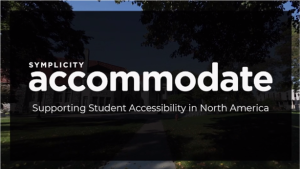2.3 Accessibility and Accommodations
Learning Outcomes
Describe teaching expectations and processes to support students with documented disabilities and others, seeking code-related support
Accessibility is allowing people with disabilities to participate fully in society regardless of their disability. At Conestoga, this involves achieving the same learning goals in different ways.
Accessibility and Accommodations at Conestoga
Accessibility is a shared responsibility among the college, faculty, and students. This follows the core AODA principles for people with visible and invisible disabilities:
- Independence
- Dignity
- Integration
- Equality of Opportunity

Faculty have a responsibility to support students who would benefit from accommodations based on their differences. Here are some examples of how to maintain the autonomy, dignity, and independence of learners with visible and invisible disabilities.
- A student may have a need to record the class. Students should be permitted to record, and faculty must preserve the student’s dignity in the classroom (e.g., by not drawing public attention to that student’s entitled accommodations).
- A student may have a condition that results in noises/outbursts in the class. Students should be able to self-manage their behaviours.
- A student may need frequent washroom or movement breaks beyond the break after 50 minutes of class. Students should be permitted to leave a regular class lesson as needed.
- A student may need to sit at the front of the class if they have no or low vision or if they are deaf. Students should be able to sit where in the class they prefer.
Accessibility allows people with disabilities to participate fully and with dignity, regardless of their differences and abilities. Accommodations for documented disabilities must be allowed and supported in ways the preserve the student’s dignity.
Conestoga’s Accessible Learning

Accessible Learning provide students with disabilities with accommodation letters that specify what accommodations faculty need to provide to ensure students can participate fully in learning and assessment in the course.
Accommodations are determined by Conestoga’s Accessible Learning (email) and are communicated to faculty through Accommodation letters sent to faculty.
Student accommodation letters can be found by faculty in Accommodate, the Accessibility Services Hub within the Employee Portal, as notified by an email sent to your Conestoga employee email. When faculty receive an accommodation letter, they will be asked to acknowledge that they have read it. Letters of Accommodations may appear at any time, may be re-generated with adjustments throughout the term, and may be applied retroactively depending on the case.

Students are responsible for accessing Accessible Learning to seek accommodations. Faculty cannot directly refer students on the student’s behalf. Accessible Learning should also be contacted by the student (or possibly the faculty on behalf of the student) if the student is sick over a long period of time to ensure supports and accommodations are in place.
5-Minute Info Search Activity
Learn more about accommodations at Conestoga. View a sample Accommodation Letter and email that accompanies the letter explaining steps to review and confirm the accommodation form.
Faculty Questions About Accommodations
You can contact Accessible Learning (email) with any questions you have about accommodations in your classroom.
Students with documented disabilities will have an Accessibility Advisor that will be listed on each student’s letter and who may be contacted if faculty have specific questions. To uphold privacy rights, faculty should discuss accommodation letters with the accommodated student and no other employee except the Accessibility Advisor, whose name will be listed on the accommodation letter. Do not give access to or provide detailed from an accommodations letter to other college employees.
Scenario 2.3 A: Seeking Accommodations
Let’s look at a scenario where a student has had experiences that may lead them to seek formal accommodations.
Lisa tells her professor, Manuel, that she has been struggling for months with stress due to personal issues, which has led to severe anxiety that has prevented her from attending class. Manuel wishes to encourage Lisa to attend class but also to seek college supports.
Should Manuel encourage Lisa to contact Accessible Learning?
- Yes, students may contact Accessible Learning for an intake appointment at any time.
Should Manuel encourage Lisa to contact Student Support Services for mental health and wellness supports?
- Yes, Manuel should refer Lisa to Student Services to support her mental health. Even if Accessible Learning cannot provide accommodations, Lisa can access Conestoga student services to support her mental health.
Should Manuel contact Accessible Learning on Lisa’s behalf?
- Faculty may reach out to Accessible Learning at any time for information, but the student must make an intake appointment on their own. Faculty may also Refer a Student to a Student Success Advisor, and the Advisor will communicate to the student what Accessible Learning may be able to provide.
Scenario 2.3B: Good Faith Temporary Student Supports
A student who indicates to a faculty member they have an injury or illness that may affect their participation in class or performance on assignments should be told to follow the advice of the student’s doctor or physician. The student may also be encouraged to seek accommodations.
Let’s look at the rights that a student has in the scenario of providing good faith temporary supports to a student with an injury pending the accommodations process.
Anoopjeet has been wearing sunglasses in class for the past week. He approaches his professor, Carl, after class to explain he has a light sensitivity after hitting his head and sustaining a concussion. Anoopjeet was told by his doctor to stay home from class, but Anoopjeet is worried if he stays home he will get behind in his course work.
Should Carl encourage Anoopjeet to keep coming to class?
- No, when students have temporary accommodation needs that involve doctor’s recommendations, faculty should respect the medical advice and support students.
- No, Carl should try to accommodate Anoopjeet while he works with his Accessibility Advisor to process his documented disability.
Should Carl request a medical note before providing the support?
- No, faculty should not obtain or keep the private medical information of students. Students who seek accommodations may be required to submit documentation to Accessible Learning.
Scenario 2.2C: Accommodations and Privacy
Faculty must keep student accommodations information private and speak about the details of the accommodation letter only with the student and the student’s Accessibility Advisor.
Let’s look at the rights that a student has in terms of privacy of their documented disabilities and accommodations letter.
Jordan accesses Accommodate on his own laptop on campus. He has 5 students with accommodations. He wonders if he should print them off to be sure he will be able to follow them throughout the term. As the Accommodate program is open on Jordan’s laptop, a colleague comes by and starts a discussion.
Should Jordan print the Accommodation letters?
- No, Jordan should not make copies of the letters or leave them in places others may see them.
Should Jordan close Accommodate before conversing with this colleague?
- Yes, the only people who are able to access Accommodations letters are Accessibility Advisors and faculty recipients. Faculty should act in ways that prevent others from seeing accommodation letters of students.
 Section 2.3 Review
Section 2.3 Review
Please pause and answer these five practice questions to review and check your learning!
